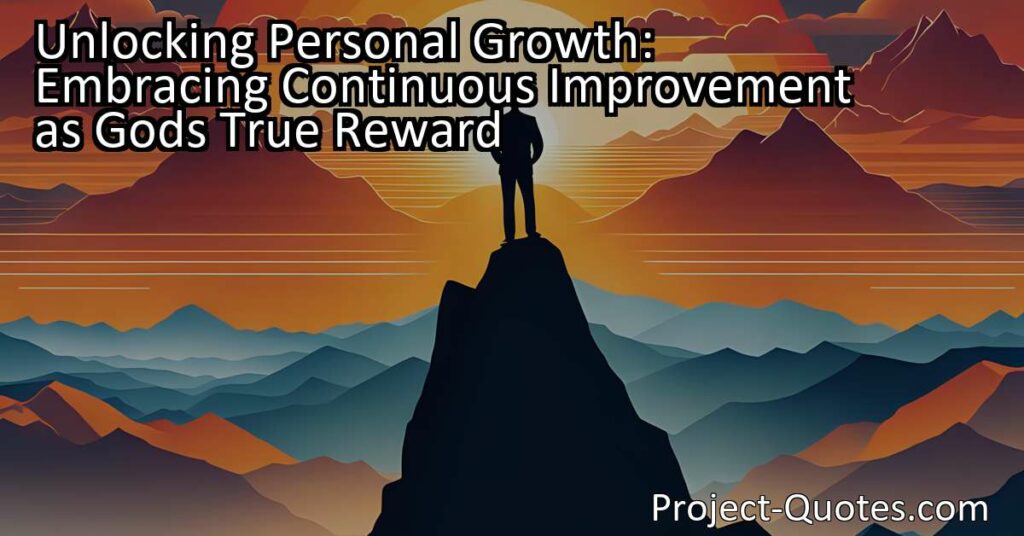The highest reward that God gives us for good work is the ability to do better work.
Elbert Hubbard
Unlocking Personal Growth: Embracing Continuous Improvement as God’s True Reward Discover the true reward for our good work according to American writer Elbert Hubbard. It’s not external praise or material wealth, but the ability to continuously improve and achieve even greater results. Embracing continuous personal growth can lead to a more fulfilling and purposeful life, guiding us towards success in various aspects of our personal and professional journeys.
Table of Contents
Meaning of Quote – The highest reward that God gives us for good work is the ability to do better work.
Have you ever wondered what motivates us to do good work? Is it the promise of monetary gain or recognition from others? While these factors can certainly play a role in our efforts, American writer Elbert Hubbard suggests that the greatest reward for our good work lies within ourselves. According to Hubbard, God’s gift to us for our virtuous endeavors is not external praise or material wealth but the ability to continuously improve and achieve even greater results.
In today’s fast-paced world, it’s easy to get caught up in the pursuit of success and overlook the significance of personal growth. We often focus on achieving specific goals and forget to cherish the journey and all the valuable lessons it offers. Hubbard reminds us that the true measure of success is not reaching a particular destination but rather our continuous development and the improvement of our work along the way.
It is through the process of striving for excellence that we find fulfillment and meaning in our endeavors. God’s reward, as Hubbard suggests, is not a one-time gift but an ongoing opportunity to refine our skills, expand our knowledge, and explore new possibilities. It is a reminder that there is no end point in our personal development journey; instead, each milestone we reach becomes a stepping stone for future growth.
Consider a student who has diligently studied for months to prepare for an important exam. When the results are announced, they receive a high score. While this achievement may bring external validation and a sense of accomplishment, the true reward lies in the knowledge and skills acquired during the study process. The ability to understand complex concepts, analyze information critically, and use problem-solving techniques effectively are the real treasures gained through their efforts. These newfound abilities can then be applied not only to future academic pursuits but also to various aspects of their personal and professional lives.
Similarly, professionals in various fields often chase after promotions, salary increases, or prestigious awards as markers of success. However, Hubbard’s perspective urges us to value the personal growth that comes with our work. The capacity to think more creatively, solve problems efficiently, and adapt to new challenges are the true rewards that allow us to continuously improve our craft.
Imagine an artist who, despite his success and recognition, feels dissatisfied with his work. According to Hubbard’s viewpoint, God’s reward is not the external praise or the monetary gain the artist receives, but rather the ability to see the flaws in his art and strive for improvement. This self-awareness and determination to do better is what separates truly talented individuals from those who may have achieved success but are stuck in mediocrity.
Moreover, Hubbard’s message resonates beyond personal achievements. It encourages us to embrace a growth mindset, not only for our own benefit but also for the betterment of society. When we continuously strive to do better, we contribute to the progress and advancement of our communities, inspiring others to do the same. Just as a ripple effect can lead to a wave in a pond, our commitment to personal development can create a positive impact on the world around us.
Furthermore, Hubbard’s quote challenges the notion that our worth and happiness are solely determined by external validation or material possessions. It emphasizes the importance of intrinsic motivation and the satisfaction that comes from knowing we have done our best. This mindset allows us to find contentment in the process itself, rather than solely fixating on the end result.
To illustrate this point, let’s look at the experience of participating in a team sport. While winning a championship may be the ultimate goal, the joy of playing the game, the camaraderie with teammates, and the personal growth gained from honing one’s skills are equally, if not more, valuable. Hubbard suggests that these intrinsic rewards are the true blessings we receive from God for pursuing good work.
In conclusion, Elbert Hubbard invites us to reconsider the concept of reward. He suggests that the ability to do better work is the highest reward that God bestows upon us for our virtuous endeavors. This gift transcends external achievements and monetary gain, guiding us towards continuous personal growth and improvement. Whether in academics, professions, or personal pursuits, embracing this perspective can lead to a more fulfilling and purposeful life. By valuing the process, embracing self-improvement, and contributing to the betterment of our communities, we can honor God’s reward and unlock our full potential. Remember, success is not solely defined by the destination we reach but by the journey of growth we embark upon.
I hope this quote inspired image brings you hope and peace. Share it with someone who needs it today!


